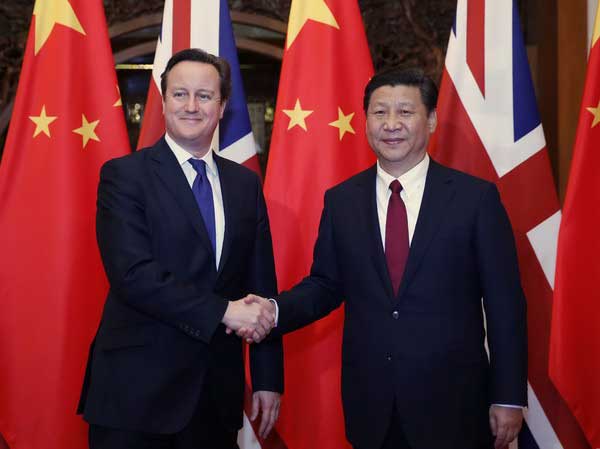

 |
| President Xi Jinping shakes hands with visiting British Prime Minister David Cameron in Beijing, Dec 2, 2013. [Photo/Xinhua] |
Editor's note:
Chinese President Xi Jinping will pay a state visit to Britain on Oct. 19-23, the first by a Chinese head of state in a decade. Xinhua is wiring a series of in-depth stories on Chinese-British relations and the visit.
Over the past years, the economic relationship between China and Britain has gone from strength to strength. The momentum will continue as the world's two major countries vow to beef up cooperation in infrastructure so as to forge "golden age" of bilateral ties.
Upon Chinese President Xi Jinping's upcoming Britain visit, George Osborne, British finance minister, announced at the Conservative annual conference in October that the government will concentrate on infrastructure projects such as rail links and power stations in the following years.
While China's acknowledged prowess in infrastructure fits the bill, and the cooperation between the two sides will undoubtedly become a new highlight in bilateral relations.
CHINA, AS GAME-CHANGER
Currently, Britain's infrastructure is in bad need of repair and construction. The nation needs to build new roads, runways and railways, increase airport capacity and secure energy supply.
Meanwhile, the British government has worked out the "Northern Powerhouse," a proposal to boost economic growth in the North of England, which involves improvement to transport links, investment in science and innovation.
The government described the improvement of infrastructure as the driver of its economic growth. While after decades of progressive development, Chinese enterprises have become an important global force in the field of international infrastructure investment and construction.
"Chinese enterprises have acquired key capabilities and a track-record in airports, railways, water treatment, offshore wind power, nuclear power plant and other projects," said a recent report launched by Pinsent Masons, a full-service international law firm based in London.
Within the infrastructure and real estate sectors, Chinese and British enterprises are capable of complementing one another, it added.
"I think the next most visible things would be Chinese investment in British infrastructure" such as nuclear industry and high speed rail system, said Gerry Grimstone, chairman of Standard Life, one of the biggest British insurance group.
Actually, the two countries have already set good examples in infrastructure cooperation with Chinese companies expanding their participation in Britain's infrastructure projects.
In 2013, Britain announced that the Beijing Construction Engineering Group would participate in the expansion of the Manchester Airport, the third busiest in the country in terms of passenger numbers.
With Chinese capacity of building high-speed railways and standards globally recognized, Britain has encouraged enterprises and financial institutes in China to participate in the HS2 railway project.
China Haror Engineering Company Ltd has been chosen to build a six-mile wall for the world's first tidal lagoon power plant in Britain's Swansea Bay in June.
When visiting China, Osborne reiterated that British government is eager for Chinese investment increasingly and there is no country in the West that opens more to investment from China than Britain.
"We expect China to invest over 100 billion pounds (some 153 billion US dollars) into Britain's infrastructure over the next decade," said Richard Laudy, head of Global Infrastructure Sector in Pinsent Masons, adding that this level of investment from China could not only help bring Britain's ageing and over utilized infrastructure up to an international standard, but could also be transformative for the British infrastructure sector.
BELT & ROAD, AIIB
"Britain should embrace China's rise, and we want a golden relationship with China that will help foster a golden decade for this country. It is an opportunity that the UK can't afford to miss. Simply put, we want to make the UK China's best partner in the West," Osborne has said in an article.
For Britain, Beijing-proposed Belt and Road Initiative and the Asian Infrastructure Investment Bank (AIIB) are good choices to strength ties with China.
Britain is the first major Western economy to join the China proposed financing mechanism. According to Osborne, the move would create "an unrivalled opportunity for Britain and Asia to invest and grow together."
British Ambassador to China Barbara Janet Woodward said that her country is glad to join the bank, because Britain is willing to share its technical experience with Asia, which needs to further increase investment in infrastructure.
Further development of infrastructure in Asia is not only conducive to the economy in the region, but also in favor of the global economic recovery, she added.
Jim O' Neil, who is responsible for boosting infrastructure and improving competition policy in Britain, said that joining AIIB is of great significance to his country to build closer relationship with China and Asia.
The island country also committed to working with China on the Belt and Road Initiative and plans to attract Chinese capital to help with the revitalization program.
The Belt and Road Initiative, which was announced by Xi in 2013, is aimed at promoting connectivity, cooperation and common prosperity along the ancient land and maritime trade routes.
"The (Belt and Road) initiative seems absolutely right to have a good investment in infrastructure and we share that ambition to make sure that the infrastructure is delivered. That's a good way to reach the whole population to help everybody out of the poverty," Amber Rudd, Britain's Secretary of State for Energy and Climate Change said.
The Belt and Road Initiative and AIIB are extraordinary thoughts, which are opening up trading pattern for countries in the world and Britain can play a major role in financing, professional services and other expertise, Grimstone said.
The comprehensive strategic partnership between China and Britain has entered its second decade, and it is believed that under the framework of the initiatives, the two countries will open a new chapter for bilateral ties.
Xinhua reporters Yang Qingchuan in Beijing and Deng Qian in London contributed to the story.
 Models change clothes on street in Hangzhou
Models change clothes on street in Hangzhou Night life in Qingdao
Night life in Qingdao In pics: army beauties across world
In pics: army beauties across world Photos of beautiful teacher hit the Internet
Photos of beautiful teacher hit the Internet Winding mountain road
Winding mountain road
 Math teacher makes 'solar powered electric car'
Math teacher makes 'solar powered electric car' Heavy traffic turns expressway into huge parking lot
Heavy traffic turns expressway into huge parking lot Chinese-American girl selected as Rose Parade princess
Chinese-American girl selected as Rose Parade princess Top 10 nominated designs at BJDW
Top 10 nominated designs at BJDW The calling
The calling Landing in China
Landing in China Sino-UK ties herald golden time with West
Sino-UK ties herald golden time with West M2 growth indicates ‘reasonable’ liquidity level
M2 growth indicates ‘reasonable’ liquidity levelDay|Week